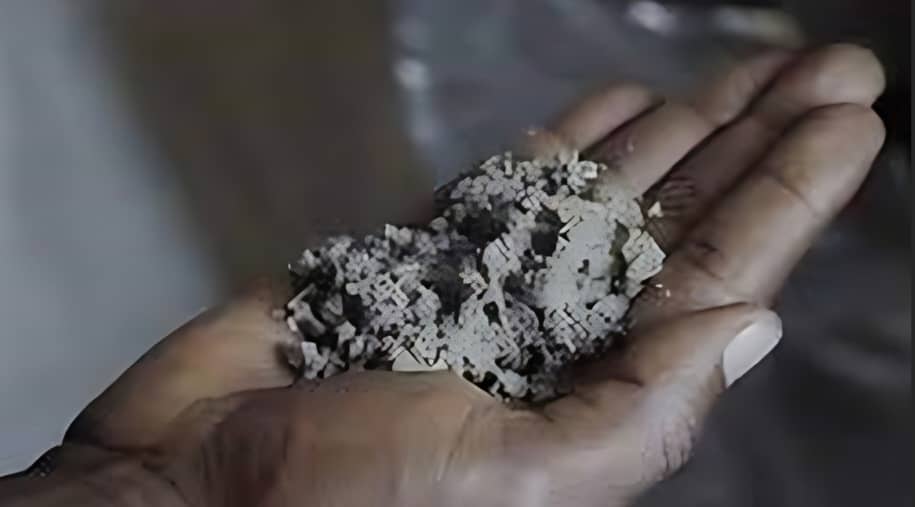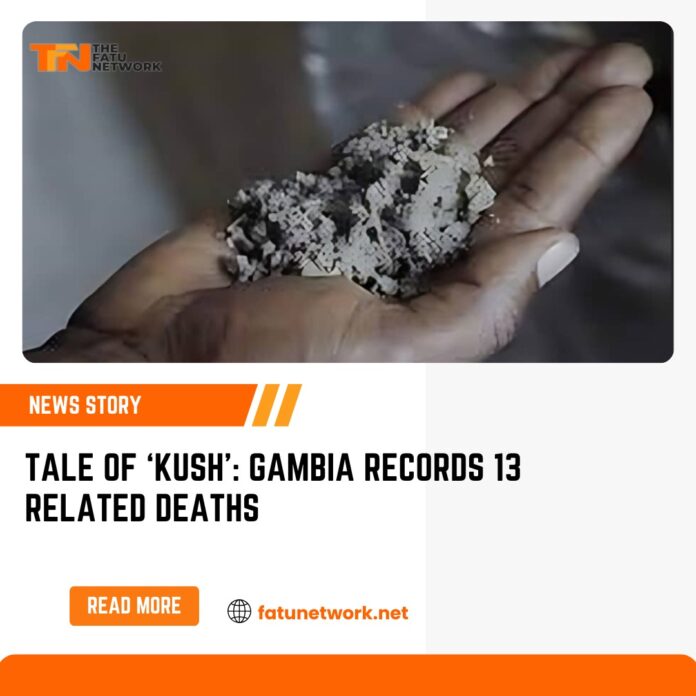
By Hawa Demba
A substance referred to as “Kush” is wreaking havoc in The Gambia with 13 related deaths mainly youth, the 5th national situation report (Sitrep 5) by the National Taskforce for Drug and Substance Abuse stated on 20th August 2024.
A subsequent situation report (Sitrep 6) indicated a percentage increase of clinical cases with the age group 14-23 years as the ‘most affected’ with 96% male, followed by 24-33 and 34-43; while 54-63 has none. The total cases (143) were reported by 10 health facilities in the country, with the Kanifing General Hospital recording the highest cases (52.5%), followed by Edward Francis Small Teaching Hospital (EFSTH), which recorded 29.5% cases.
The substance is ‘mostly’ consumed by the mentioned age group, with symptoms such as drooling saliva, swollen tongue and lips, pain and restlessness- which accounted for 64.7%. It also triggers abusers to sleepwalk, bang their heads against hard surfaces and walk into moving traffic resulting in very tedious situations. The National Taskforce for Drug and Substance Abuse “KUSH” records revealed.

Commissioner Pa Bojang, Chairperson, National Taskforce for Drug and Substance Abuse “KUSH” shared that the preliminary analysis of ‘Kush’ indicated the presence of chemical components such as Cannabis sativa, Cannabis indica, Moringa leaves, Fentanyl and Tramadol. He revealed that Sukuta Zoo, Tallinding, Bundung, Faji Kunda, Bakoteh in the Greater Banjul Area and Nyamanarr village in the Upper River Region are ‘the biggest Kush markets’ in the country.
In the Gambia, it is a public perception that drug abuse especially, among the youth, is not for pleasure, but for stress, anxiety, and depression relief. The perception also includes peer influence and curiosity as other causes of substance abuse in the country.
A former ‘Kush’ abuser, who claimed to have started taking the substance due to unemployment, shared his experience with this medium. “This country is very hard … I have searched everywhere for a job, but to no avail. So, I got depressed and frustrated, and I felt this (taking ‘Kush’) was the only way to better my life,” he recalled.
How does ‘Kush’ affect health?
A senior mental health nurse at Kanifing General Hospital, Amadou D. Jallow, said that taking the substance involves ‘the risk of dying’. Other health implications of taking the substance include post-traumatic stress disorder, among others.
“The health implications of Kush are the risk of dying and swollenness of the tongue which blocks the airways and makes the individual suffocate or not be able to have oxygen in his or her system and as a result causing the individual to lose oxygen in the brain which would eventually lead to death. The other health implication is, the patient can have psychological problems- that is behaving like a psycho in which the individual can be hearing voices that are not real, acting restless and aggressively, and he/she might not be able to sleep like before,” he explained.
Health workers encounter challenges when treating cases with the manifested symptoms of the substance. A nurse at a local facility, Tuti Kujabi treated a patient in a ‘critical condition’ with such symptoms.
“When the escorts came with the boy with his tongue out and eyes rolling, I got terrified… I’m glad I treated him, and I will continue to help because abandoning them is not the right decision. We have recorded three critical Kush patients on that same day. I treated one patient and my colleagues treated two during their night shift and these are very young boys who are aged from 14-25,” she shared.
The government explored measures to tackle the substance blamed for the 13 deaths. The efforts include the constitution of a national task force to look into the matter. Despite this, there is no scientific proof of its connection with the deaths due to the lack of a laboratory in the country. The senior mental health nurse, Jallow confirmed this challenge.
“It is still unknown as to whether those people are affected by Kush or not because there is no laboratory to test the urine or blood samples of victims that are suspected of consuming the substance. Even the analysis that has been done so far shows that there is some content of Cannabis but the rest of the components is still not known,” he revealed.
Fight against the substance
A review of Drug Law Enforcement Agency seizure statistics from 2020 showed that the institution has not registered any seizure of ‘Kush’. It also showed that 7g of suspected Kush was reportedly seized in 2021- with an increase in regional seizure of 9g in 2021. There were no seizures in 2022, while the weekly seizure statistics for 2023 showed a fluctuating trend with 7,353,121kg seized. However, no seizures were made in January and February of the year.
The Drug Law Enforcement Agency, Gambia (DLEAG) enforces all drug laws and regulations in the country and brings perpetrators to justice. At a press conference, DLEAG Director General, Demba Ceesay, told journalists with certainty that his agency’s fight against drugs is ‘winnable’.
“We are working tirelessly with our men and women at the DLEAG to instil in them the right aptitude (and) to better equip them for the task they have signed up for. Our fight against illicit drug trafficking and abuse has not been helped by situations in some parts of our communities. We, therefore, call on all cross-sections of Gambian society to join the bandwagon in the fight against drugs,” the DLEAG leadership said.
Global Initiative Against Transnational Organised Crime (GITOC) designed a research study into ‘Kush’ in Sierra Leone with the Clingendael Institute. The research aimed to support civil society and authorities in West Africa, and the rest of the world to develop evidence-based responses by providing more data.
Initial tests using an FTIR spectrometer by the global initiative showed that the substance contains synthetic cannabinoids and significant natazenes. The components of the substance are sprayed onto marshmallows and other leaves. The report provided no official figures on the death toll in West Africa related to ‘Kush’, but authorities in Sierra Leone said that the numbers are tragically significant.
‘Kush’ is said to be a ‘toxic poly-mixture’ that has detrimental effects on health and causes death. Its possession, distribution and trafficking are illegal under the Gambia’s related laws, including the Drug Control Act of 2003.
Ends
Editor’s note: This story has been produced under Freedom House (Promotion of Right to Justice) Investigative Journalism Fellowship 2024. However, the story has been independently produced in accordance with the ethics of journalism.




